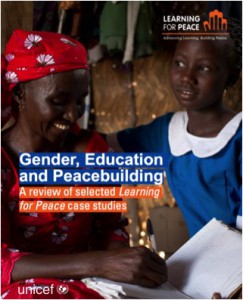
Gender, Education and Peacebuilding: A Review of Learning for Peace Case Studies, UNICEF, 2016
Global analysis conducted by Learning for Peace has demonstrated that conflict is less likely in contexts where there is gender parity in terms of average years of schooling. Analysis has furthermore shown that gender inequality in education increases in response to the incidence of conflict. At the country level, Learning for Peace has shown linkages between attitudes related to gender equality in education and the strengthening of social cohesion. Indeed, Learning for Peace activities at the country level have provided opportunities to generate important lessons on and stimulate promising practices around the role of education in implementing gender-transformative peacebuilding strategies.
This report reviews and analyses evidence from four selected Learning for Peace projects. The overarching question the review seeks to answer is: How can education interventions address gender inequalities in contexts of armed violent conflict and in the process contribute towards sustainable peace? In other words, what do the four case studies tell us about how a gender-transformative approach to education for peacebuilding can strengthen its policy and practice?
The four case studies cover a range of contexts, institutional settings, categories of learners, and educational activities. In Uganda, the review examined the Gender Socialization in Schools in Uganda (GSSU) teacher training pilot project in the country’s Karamoja region, which aimed to support teachers in managing safe and equitable classrooms. In the Democratic Republic of the Congo, the review selected a component of work in Equateur province in which in-school youth were mobilized to design their own peacebuilding projects. In Côte d’Ivoire, the review examined an initiative to provide members of Mother and Early Childhood Clubs with training and mentoring, enabling them to support the village-based early childhood development centres (ECDCs) that cement relations between women from different ethnicities. The focus of the final case study
is the Communities Care (CC) programme, which concerns the development of a methodological approach for working at the community level to reduce the incidence of violence against women and girls (VAWG): The methodology, which seeks to transform negative social and gender norms into positive ones, is encapsulated in a toolkit manual and will be applicable in any conflict environment. The approach is currently being piloted in South Sudan and Somalia.
This report summarizes the findings of the four case studies, and outlines conclusions of relevance to future peacebuilding strategies and programmes seeking to adopt gender-transformative6 strategies.
Download the report: Gender, Education and Peacebuilding – Review of Learning for Peace Case Studies

